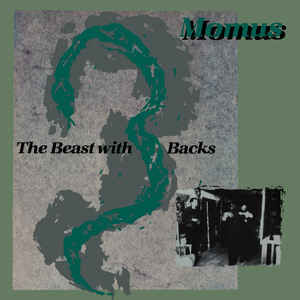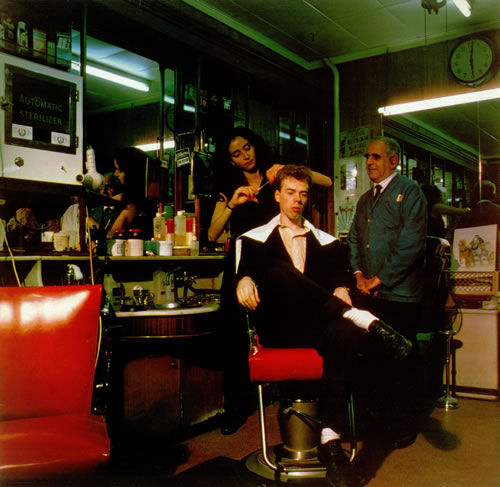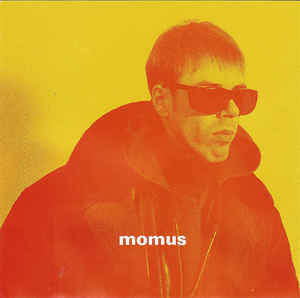Next thing you know.. #3 The Beast with 3 Backs.
- John Robinson
- Aug 14, 2019
- 3 min read
Updated: Aug 23, 2019
One of the songs recorded as a demo for the Happy Family was called "The Poison Boyfriend", and represented a departure into new territory. The songs Currie started writing after The Happy Family moved into new areas of psychosexual dynamics and explored concepts of promiscuity and perversion. He wanted to explore love, romance and relationships in a more explicit way than pop music would allow. This new approach called for a new persona: Momus. The greek god of mockery and satire, a character from Kafka and an appropriate mask for one who would unflatteringly depict our grossest desire and mistakes. The earliest demos afforded a sign up with él Records and the release in 1985 of the first true Momus release: The Beast with 3 Backs. The EP consisted of three songs each detailing a love triangle. The music here is based around the acoustic guitar with calm but clear singing and plaintive melodies. Momus aimed to find the chord that would melt hearts and make people cry with a sound and image very much that of the classic folk singer/songwriter, and was very influenced by Brel. Which is not to say that the music didn't still contain elements of post-punk, as we shall see.

Ballad of the Barrel Organist: The title of itself has strong and immediate connotations of Brel, of cabaret and music hall. The harshly strummed guitar is alternately pretty and sinister, the lyrics outline the tale of a couple running in from the rain to an assignation which seems to involve a voyeur, or possibly a partner not present. It's important to note how clear and precise the detail of the encounter is, there's no overt pretension or poetry to these lyrics now.
"Stop the night of this pain in my neck That wrecks any chance of a semi-acceptable sexual technique".
There's an old lady who owns a spare key: presumably the landlady, who they hope will arrive and end the embarrassment of this unsuccessful coupling. Or join in. Who knows.
We get - again - a nursery rhyme being used, here it is the old lady who swallowed a fly, as a metaphor for the problems which are building up. There's an exasperated rant at a "copycat clerk" from Barclay's bank. Maybe they were refused a mortgage.
In the end "perhaps we'll die" is the sinister refrain.
Third Party, Fire and Theft: No acoustic this time, we get a prepared piano (I think) and some evidence of the remaining post-punk influence in a staccato guitar backing and punch drum.* It's the tale of (what may be) an insurance salesman who can't perform for his wife, who is mocking him for it, and his fears of an adulterer coming to take his place. This seems to be confirmed by finding cigarette ash in the bed. Good job he has insurance.
There's actually guitar feedback - a rarity with Momus - in the middle and it really works to represent the possible violence when the two men meet. Which doesn't come to much as the narrator "can't afford to sprain his wrist", which of course a guitar player can't. The last verse throws in references to Laura Ashley, Durex and Marlboro. This shows a desire to ground the story in the real world but as Momus would find later, it also proves to be a risky strategy to use brand names in such a twisted narrative.
Hotel Marquis De Sade: The story of two middle class English boys and a middle class English girl having a threesome in a Mediterranean hotel. Calling it the Hotel Marquis De Sade is a little obvious, but makes the point as well as anything. Given Mr. Currie lived in Greece for a while, it's easy to muse if this is autobiographical. It's acoustic again, with some form of woodwind and backing vocals, as well as atmospheric effects, and very pretty, although the actual chorus of "beast with three backs" and associated "ba ba s" is rather grating. The highlight is the last minute where Momus goes all ASMR and whispers lines from the Wasteland, which is about imagining a third person being present. It's spooky and by far the most memorable part of the EP for me.
The EP included the tag line: "First in a series of Immoral Tales and Imaginary Lives. Next: Momus sings the Old Testament to the new instruments."
He did too. The first full Momus album Circus Maximus was released three months later, along similar lines musically and was indeed a concept album based on the Old Testament.
*I have no musical knowledge to speak of. If I say there's a clarinet when it's an oboe, live with it.






Comments